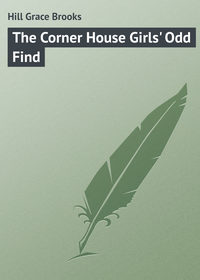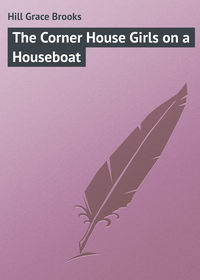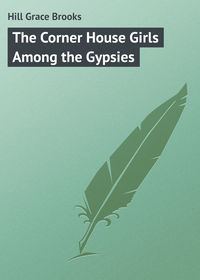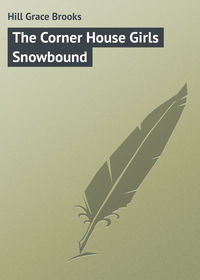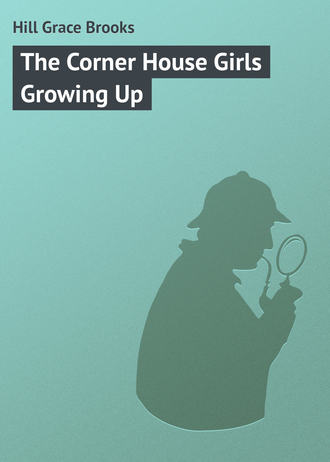 полная версия
полная версияThe Corner House Girls Growing Up

Hill Grace Brooks
The Corner House Girls Growing Up What Happened First, What Came Next. And How It Ended
CHAPTER I
ALL UP IN THE AIR
It all began because Tess Kenway became suddenly and deeply interested in aeroplanes, airships and "all sort of flying things," as Dot, the smallest Corner House girl, declared.
Perhaps one should modify that "suddenly"; for Tess had begun to think about flying – as a profession – as long ago as the winter before (and that was really a long time for a little girl of her age) when she had acted as Swiftwing the Hummingbird in the children's play of The Carnation Countess.
At any rate she said to Sammy Pinkney, who was almost their next door neighbor, only he lived "scatecornered" across Willow Street, that she wished she had an airship.
And there! "Scatecornered" must be explained too; it was an expression of Uncle Rufus' who was the Corner House girls' chief factotum and almost an heirloom in the family, for he had long served Uncle Peter Stower, who in dying had willed the beautiful old homestead in Milton to his four grand-nieces.
"Just what does 'scatecornered' mean, Uncle Rufus?" asked Dot, who delighted in polysyllables.
"Why, chile, 'scatecornered' am a pufficly good word, fo' I has used it all ma life. It's – er – well, it's sort of a short-cut for de meanin' of slantindicular an crisscrosswise; w'ich means dat it ain't straight an' ain't crooked, but sort o' – er – scatecornered. Dere, chile, now you knows."
"Yes, Uncle Rufus; thank you," said Dot, polite if she did feel rather dizzy after his explanation.
But it was with Tess, who was nearly two years older than Dot and thought herself vastly more grown up, and with Sammy Pinkney this story was begun, and one should stick to one's text.
"Yes," murmured Tess, "I wish I had an airship."
Sammy looked at her, rather awed. Lately he was beginning to feel a mite awed in Tess Kenway's company, anyway. She had always been a thoughtful child. Aunt Sarah Maltby declared she was uncanny and gave her the fidgets. Of late even the boy who desired to be a pirate found Tess puzzling.
"Huh! An airship? What would you do with it? Where would you keep it?" he finally demanded, his queries being nothing if not practical.
Really Tess had not addressed him directly. She had just audibly expressed a thought, and one that had long been in her mind in embryo. So she did not answer the neighbor boy, who was sitting beside her on the side stoop of the Corner House, rigging a self-whittled ship to sail in the horse-trough.
"You know very well it wouldn't go in the garage; and the toolshed and the henhouse – even Tom Jonah's house – are all too small. Huh! that's like a girl! Never look ahead to see what they'd do with an airship if somebody gave 'em one."
"Well, I don't s'pose anybody will," admitted Tess, with a sigh, having heard at least the last part of Sammy's speech.
"Anybody will what?" demanded Sammy, beginning to be somewhat confused, partly from not knowing what he himself had been saying.
"Give us an airship."
"I should say not!" ejaculated Sammy. "Why, Tess Kenway, an airship would cost 'most a million dollars!"
"Is that so?" she said, accepting Sammy's slight overestimate of the price of a flying machine quite placidly.
"And folks don't give away such presents. I should say not!" with scorn.
"Why, Neale O'Neil's Uncle Bill Sorber wants to give Dot and me a calico pony, and that must be worth a lot of money."
"Huh! What's a calico pony? Like one of these Teddy bears?" sniffed Sammy. "Stuffed with cotton?"
"No it isn't, Mr. Saucebox!" broke in Agnes Kenway, the second and prettiest of the Corner House girls, who had just come out on the porch to brush her sport coat and had overheard the boy's observation. "That calico pony is well stuffed with good oats and hay if it belongs to Twomley & Sorber's Herculean Circus and Menagerie. Neale's Uncle Bill feeds his horses till they are as fat as butter."
"Oh!" murmured Sammy. "A real pony?" and his eyes began to shine. He had owned a goat (it was now Tess' property) and he now possessed a bulldog. But he foresaw "larks" if the two smaller Corner House girls got a pony. The older ones often went out in the motor-car without Tess and Dot, and the suggestion of the pony may have been a roundabout way of appeasing the youngsters.
"But say!" the boy added, "why did you call it calico? That's what they make kids' dresses out of, isn't it?"
"Mine's gingham and I'm not a kid," declared Tess both promptly and with warmth.
"Aw, well, I didn't mean you," explained Sammy. "And why do they call a pony 'calico'?"
This was too much for Tess and she put it up to Agnes.
"Why – now," began the older sister, "you – you know what a calico cat is, Sammy Pinkney?"
"Ye-es," Sammy said it rather doubtfully, however. "That's like Miss Pettingill's got down the street, ain't it?"
"O-o!" cried Tess. "That's all colors, that old cat is!"
"It's sort of mottled and patchy. That's it – patchy!" declared Agnes, seizing the suggestion of "calico" and "patchwork" to make out her case.
"But," complained Tess, "I didn't think the pony would be as many colors as Miss Pettingill's cat. You know she calls him Rainbow."
"Why, the pony is only brown and white – or cream color," Agnes said with more confidence. "And maybe a little pink."
"Ho! ho!" snorted Sammy. "Now you are stringin' us. Who ever heard of a pink horse?"
Agnes went in without hearing this remark, and perhaps it was as well for Sammy Pinkney. Tess said severely:
"Our Agnes does not string people, Sammy. If she says the pony is pink, it is pink, you may be certain sure."
"And chocolate and cream color, too?" sniffed the boy. "Hum! I guess a pony as funny as that would be, could fly too. So you'll be fixed up all right, Tess Kenway."
"Dear me," sighed the little girl, coming back to their original topic of conversation. "I wish we did have something that would fly."
Now, secretly, Sammy was very fond of Tess. When he had had the scarlet fever that spring and early summer, his little neighbor with the serious face and dreamy look had been the most attentive friend one could ever expect to have.
She had called morning and night at his house to get the "bulletin" of his condition; and when he was up again and the house was what Dot Kenway had mentioned as "fumigrated," Tess had spent long hours amusing the boy until he could play out of doors again.
Besides, she had much to do with his accompanying the Corner House girls on their recent motoring trip, and Sammy's own mother said that that vacation journey had "made a new boy of Sammy."
This new boy, therefore, did not scorn to put his mind to the problem of Tess Kenway's distress. But an airship!
"I say, Tess," he said at last with some eagerness, "how'd one of them airmajigs be that father brought me home from the city once – only a bigger one?"
"What is an airmajig?" demanded Tess, her curiosity aroused if nothing more.
"Well, it's a dinky thing – pshaw! you remember. You stretched a wire, and then wound it up – "
"Wound up the wire?"
"Naw! Oh, jingo! The ship, I mean. It was run by a clock. And you hung it on the wire when it was wound."
"The clock?" asked Tess, still absent-mindedly.
"Oh! Je-ru-sa-lem! Girls don't know nothin' about mechanics," snarled Sammy. "What's the use!"
Tess asked in an apologetic voice, after a moment of silence:
"What happened, Sammy?"
"What happened to what?"
"The airmajig?"
"Why, it traveled right along the wire – hanging to it, you know," explained the little boy with more enthusiasm. "It would go as far as the wire was long. Why, I bet, Tess Kenway, that it would run from your house to mine. And it wiggled its wings just like a bird. And there was a tin man in it. But pshaw! that was just for kids. It was a toy. But a bigger one – "
"Oh, Sammy! big enough to carry us?" gasped Tess, clasping her hands.
"Er – well – now," hesitated Sammy, whose own imagination was hampered by a very practical streak in his character. "That would be some airship, wouldn't it? To carry us. It would have to be pretty big, and the wire'd have to be awful strong."
"Oh, it wouldn't be flying, then," sighed Tess.
"But say!" he exclaimed more eagerly, "couldn't we fly your dolls in it – yours and Dot's?"
"Oh!"
"That would be great!"
The screen door slammed behind them. "No," declared a serious and very decisive voice. "You sha'n't fly my Alice-doll like a kite, Sammy Pinkney. So there!"
They turned to the dark, fairy-like little girl who had appeared fresh from her afternoon toilet at the hands of Mrs. MacCall, the old Scotch housekeeper who loved the Corner House girls as though they were her own.
Dot, as usual, clung tightly to the pink-faced, fair-haired doll which of all her "children" was her favorite. The Alice-doll had been through so many adventures, and suffered such peril and disaster, that Dot could scarcely bear that she should be out of her sight for fear some new calamity would happen to her.
Therefore Dot said quite firmly:
"No, Sammy Pinkney. You're not going to fly my Alice-doll. And I should think you'd be 'shamed, Tessie Kenway, to let him even talk about it."
"Aw, who's goin' to hurt your old doll?" growled Sammy.
"She's not an old doll, I'd have you know, Sammy Pinkney!" responded Dot, ready to argue the point with anybody. "She's just been made over. Didn't Neale O'Neil have her taken to the hospital? And didn't they make over her face just like society ladies get theirs done by a der – der-ma-olywog?"
"Mercy, child!" gasped Tess. "'Dermatologist' the word is. Ruth told us."
"And they bleached her hair," concluded the excited Dot. "So there! Lots of ladies have their hair bleached. It's quite fashioningble."
"Dot! Dot!" begged the purist, Tess, "do get your words right if you will use such long ones."
Dot haughtily overlooked any such interruptions. "So," said she, "you sha'n't make a kite out of my Alice-doll," and she hugged the child to her bosom with emphasis.
"It isn't a kite," explained Tess, indulgently. "Sammy was talking about airships. He had one that had a clock in it and it flew on a wire – "
"Oo-ee!" squealed Dot suddenly. "I 'member about that, Sammy Pinkney. And your mother said you shouldn't ever have such a contraption in the house again. It busted the parlor lamp."
"Oh, dear! I wish you'd say 'bursted,'" sighed her sister.
"But if it had been out of doors," Sammy grumbled, "where there weren't any lamps and things, it would have worked fine. I tell you, Tess, we could string it from your house to mine, and the carrier could be loaded up at one station and unloaded and loaded again at the other. Crickey, it would be fun!"
"But maybe Ruthie wouldn't let us do it," suggested Tess, beginning to be enamored of the boy's idea, yet having her doubts about the feasibility of the plan. "It would knock people's hats off."
"What would!" gasped Sammy.
"The wire – or the airship traveling back and forth."
"Oh, Je-ru-sa-lem,'" again exploded Sammy. "You wanted an airship, didn't you? 'Way up in the air – not so's you can reach it from the ground. Why, we'll string the wire from my bedroom window to one of the windows of the room you and Dot sleep in."
"Oh!" cried Dot, beginning to visualize the scheme now. "Just like the cash-carriers in the Five and Ten Cent Store."
"But Ruthie wouldn't let us, I'm afraid," murmured Tess, still doubtful.
"Let's ask her," said Sammy.
"Oh, let's!" cried Dot.
But when they hunted for Ruth, the eldest of the four Corner House girls, she was not to be found on the premises; and if the children had but known it just at that time Ruth Kenway was having an adventure of her own which was, later, to prove of immense interest to all the Corner House family.
CHAPTER II
THE OLD GENTLEMAN WITH THE GREEN UMBRELLA
Nobody had ever called Ruth Kenway pretty. That was, perhaps, because her next youngest sister, Agnes, was an acknowledged beauty. Everything is comparative.
Mrs. MacCall said that "handsome is as handsome does." Then, of course, in the minds of the other members of the Corner House family, Ruth was very beautiful indeed.
She had a lovely smile, and a low sweet, "mother" voice. She was, indeed, all the mother Dot had ever known; nor could Tess remember their "really-truly" mother very clearly.
Ruth had been calling on the other side of town. She went once a week without fail to have afternoon tea with Mr. Howbridge, their guardian and the administrator of the Stower estate, and this was the afternoon for that pleasant duty.
If there was anything of a serious nature to be talked over between the lawyer and the oldest Corner House girl, it was done in his pleasant library over the old silver tea service, where there were no "small pitchers with big ears."
"And so our moneys are growing, Ruth," Mr. Howbridge said thoughtfully, having ended the discussion of some minor point of business. He admired Ruth's good sense as well as her character, and so frequently discussed matters of business with her that he was not obliged by his oath of office to do.
"In a few months we shall have considerable cash on hand in the bank; and three and a half per cent. is small interest on a large sum of money. Somehow we must invest it."
Ruth's eyes twinkled. "I suppose you really need our advice, Mr. Howbridge? Of course, if you left it to the Corner House girls to invest it would probably bring in only a high percentage of enjoyment.
"Agnes would have a flock of automobiles. Tessie would spend it all on making other people happy. Dot would have an entire sanitarium devoted to the treatment of dolls."
"And you, my dear?" asked the lawyer, smiling.
"Ah, if you want my advice, Mr. Howbridge, you must do as all your clients have to do. You must give me a retainer," and she rose, laughing, to don her light coat.
"But I will keep my mind on it," she added. "Who knows? Perhaps some wise thought may fly my way. And all that money! It will really make a fine investment."
"Remember, you girls will expect your 'dots' out of the estate some day," chuckled Mr. Howbridge. "Your own dowry will come first, I presume, Ruth."
"Me? Get married? With the children so dependent upon me?" gasped the eldest Corner House girl. But she blushed warmly and averted her eyes from the shrewd gaze of the lawyer. "Now you are talking nonsense, Mr. Howbridge."
He let her go without comment. But to himself he murmured:
"I never knew it to fail. These girls who are determined to be spinsters are always the first to be caught in the coil of matrimony."
If Ruth's thoughts lingered upon such a ridiculous suggestion (ridiculous from her standpoint) after she left the lawyer's house, her expression of countenance did not show it. She walked cheerfully along the shaded street toward Milton's railroad station, for the old Corner House stood upon the corner of Willow and Main Streets, opposite the Parade Ground, quite on the other side of town.
She crossed the canal and was almost in sight of the station when she saw a tall figure ahead of her whose singular gait and old-fashioned manner of dress would have caused comment anywhere.
To wear a "stove-pipe" hat on a hot day like this, with a heavy, dark frock-coat and gray trousers, with his feet encased in overshoes, seemed to the casual observer rather ridiculous.
"Why," thought Ruth, "he looks as Seneca Sprague might if he were dressed up and going to his own wedding," and she laughed to think of that ridiculous possibility regarding one of the well-known characters of Milton.
This old gentleman was a stranger to her, Ruth was sure. Milton being a junction point of two railroads, there were often strangers about the railroad station waiting for connections on one or the other of the roads. This man must be, the girl thought, such a marooned passenger.
As he reached the edge of the shade cast by the trees on Pleasant Street and stepped into the glare of the open square about the railway station, he unfurled a huge umbrella and raised it to shield himself from the sun's glare. It was a most astonishing umbrella. The upper side was a faded green; the under side an age-yellowed white.
"Why," thought Ruth, "it must be an heirloom in his family."
Amused, she continued directly behind the old gentleman as he started to cross the four tracks which blotted the center of Milton. Accidents had happened more than once at this grade crossing, and the town councilmen had been in hot water with the taxpayers for some years regarding the changing of the railroad's level.
There were drop gates, but only one decrepit watchman here at Pleasant Street. Ruth always looked both ways when she started to cross the tracks. And at this time – or about this time – in the afternoon the so-called Cannon-Ball Express went through. That train did not even hesitate at Milton.
Quite as a matter of course, the girl halted when she came to the tracks and looked both east and west. A freight train was backing down past the station on the third track. The second track was open for passenger traffic. There was a growing roar from the west.
The old gentleman stopped and peered in that direction. He could easily have crossed ahead of the slow freight, but like Ruth he was doubtful regarding the growing clamor of the approaching express, although that fast-flier was not yet in sight at the curve.
"But it's coming!" murmured Ruth. "He mustn't cross!"
The old gentleman with the green umbrella had no intention of crossing ahead of the express; but Ruth heard him utter an impatient exclamation as he stepped back a little from proximity to the second track, the first track being merely a siding for shunted freight cars.
He was so close to the oldest Corner House girl now that she could view his countenance easily without appearing to be curious. But she was curious about the old gentleman. However, being Ruth Kenway, she would not have shown this in any way to ruffle his feelings; for, despite her own youth, Ruth had mothered her three orphaned sisters for so long that she was more sedate and thoughtful than most girls of her age.
Just at this moment the Cannon-Ball Express came tearing into view, shrieking its warning for the Pleasant Street crossing. The old gentleman was standing too near the rails, in Ruth's opinion. She involuntarily put forth her hand and seized hold of his coat. He turned to glare upon the freshly dressed, sweet-looking girl beside him with what would have been an audible grunt of disapproval had the oncoming train not made such a noise and with a look that caused her to drop her hand immediately.
His face was a marvelous network of wrinkles; he wore amber dust-goggles; his mouth was a grim slit in his brown face, like the trap of a letter-box. It did not seem possible that any one could look on Ruth Kenway's sweet face with such a grim and unkind expression on the countenance. But the man turned from her with no softening in his look.
The express was now fairly upon them. The suction of such a rapidly flying train is considerable. And that huge umbrella made the accident unescapable.
The train shrieked by. Ruth herself felt the wind of it, and her skirts blew around her body tightly.
The blast got beneath the big umbrella, and Ruth saw the old gentleman seize hold upon the handle with both hands. The umbrella bellied and creaked. The last car whisked past, and within the cyclone of flying sand and gravel which followed it the unfortunate old gentleman was caught.
Clinging to his umbrella, which was really the cause of all his trouble, he whirled like a dervish across the second track in the wake of the express, and stumbling, went to his knees between that set of rails and the third track, on which the freight train was backing slowly toward them.
Had he put the umbrella down he would have been all right. But his stubborn character was displayed to the full by his still gripping the unwieldy thing and, like "Old Grindstone George," hanging on to the handle. He staggered to his feet, the umbrella quite hiding the coming freight train from his view, and stumbled a pace forward, directly toward the third track.
Ruth, with a startled scream, forgetting self, ignoring the man's former scowls and harshness, sprang forward and again seized the old gentleman's coat, this time with firmness and a determination not to allow herself to be repulsed.
While Ruth Kenway is struggling to save this stranger from accident and probable death, it is a good time to turn back and give those readers who are making the acquaintance of the Corner House girls for the first time in this present volume a little sketch of who these girls are and of their adventures and pleasures as set forth in the previous volumes of this series.
In the first book of the series, entitled "The Corner House Girls," the sisters are introduced as living in a larger city and in very poor circumstances. Their father and mother being dead, Ruth had to manage for the family on a very small pension from the Government. Aunt Sarah Maltby, who was peculiar in more ways than one, was a liability instead of an asset to the family.
This queer old woman was always expecting that a large fortune would be left to her when Mr. Peter Stower, of Milton, should die. Mr. Stower had quarreled with all his relatives. Especially had he quarreled with his half-sister Sarah. Nevertheless, Aunt Sarah believed his money and the old homestead would come to her.
Instead, Mr. Stower willed it all to the four Kenway girls, making Mr. Howbridge the administrator of the estate and the guardian of the girls. Therefore, Miss Sarah Maltby was still a pensioner on the bounty of the Corner House girls, and the fact perhaps made her more crabbed of temper than she otherwise might have been.
Having settled down in the old Corner House to live, with Mrs. MacCall as housekeeper and Uncle Rufus as man of all work, the girls next took up the matter of education, as related in "The Corner House Girls at School." The four sisters got acquainted with their new environment and made new friends and a few enemies. Particularly they became chummy with Neale O'Neil, the boy who had run away from a circus to get an education. Neale became a fixture in the neighborhood, living with Mr. Con Murphy, the cobbler, on the street back of the Corner House. He became Agnes Kenway's particular and continual boy chum.
During the summer vacation Ruth and her sisters went to Pleasant Cove where they thoroughly enjoyed themselves and had adventures galore, as told in the third volume, entitled "The Corner House Girls Under Canvas."
As has been already mentioned, the sisters had parts in the school play The Carnation Countess, the following winter. Tess was Swiftwing, the Hummingbird, and Dot, a busy, busy bee, a part that the smallest Corner House girl acted to perfection. Agnes, who had a bent for theatricals, was immensely successful as Innocent Delight, and Ruth, of course, did her part well. In "The Corner House Girls in a Play," the fourth volume, these adventures and incidents are detailed.
"The Corner House Girls' Odd Find" made two of their very dearest friends wealthy, and incidentally brought to the sister what Agnes had longed for more than "anything else in the whole world" – a touring car. In that they took a long trip, as related in "The Corner House Girls on a Tour." On that journey, but recently completed, Neale O'Neil had accompanied the sisters to drive the car. Mrs. Heard, a good friend, had been their chaperon, and Sammy Pinkney, the boy who was determined to be a pirate, was what Neale termed "an excrescence on the touring party" during the exciting trip.
Ruth Kenway had been thinking of something that had occurred during their automobile trip just before spying the old gentleman with the green umbrella. She had that very day received a letter from Cecile Shepard, whom, with her brother Luke, the Corner House girls had met during their tour. And Ruth hoped that Cecile would spend a week at the old Corner House before going back in September to the preparatory school which she attended.


